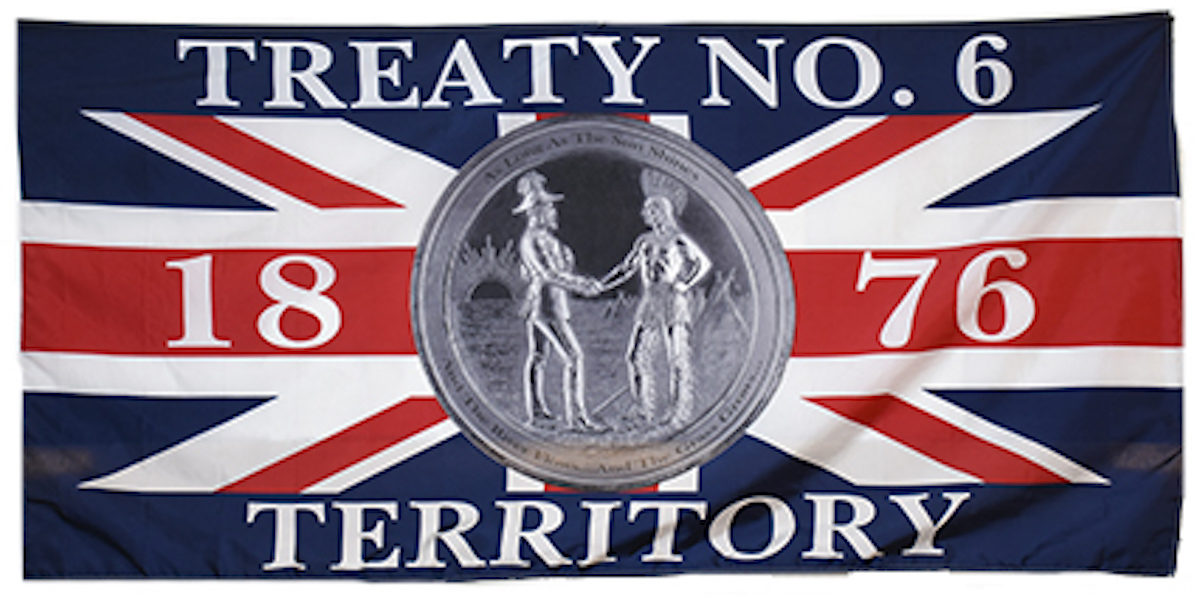The chiefs of the Confederacy of Treaty 6 First Nations emerged from their first meeting with Danielle Smith clearly unimpressed with the Alberta premier’s glib patter about the significance to their people of the so-called Alberta Sovereignty within a United Canada Act.
In a terse 150-word media release, the Treaty 6 chiefs stated: “It was clear from our discussions that Premier Smith does not understand our Treaty or our inherent rights nor does she respect them.”
The chiefs of the Alberta First Nations of the Treaty 6 Confederacy are deeply concerned by the implications of United Conservative Party (UCP)’s sovereignty agenda and have urged the Smith Government “to withdraw and reconsider any legislation that pretends jurisdiction over Treaty Lands and Peoples,” as does the Sovereignty Act.
“Nor do we agree that an invitation on the day of the Throne Speech is an inclusive approach to hearing Albertans and Indigenous voices in a meaningful way for such a dangerous piece of legislation,” the blunt communique continued.
“The Premier will not dictate how we will be consulted – we point her once again to the duty to consult to learn more about how to engage and work with us appropriately,” it said.
Indeed, the statement clarified that despite the meeting, “this does not, in any way or sense, constitute her duty to consult with regard to matters of mutual concern” – a reference to rulings of the Supreme Court of Canada that Canadian governments must engage in good faith consultations with First Nations on land and resource decisions that impact Indigenous interests.
The chiefs’ statement was surprising only in its bluntness. It should be clear to all from the actions of the UCP Government that Premier Smith either does not understand the historical and contemporary meaning of the treaties between First Nations and the Crown, or chooses not to understand.
Among the fundamental principles of Treaty 6, which extends from Alberta into Saskatchewan and Manitoba, is that “at no time did Treaty First Nations relinquish their right to nationhood, their Inherent Right to determine their own destinies, nor did they allow any foreign government to govern them,” the Confederacy’s website states.
“Our Treaty relationship is with the Crown, currently represented by King Charles III, while the federal government serves as a conduit,” the chiefs explained in a news release on Nov. 23.
All of Alberta occupies the territory of Treaty 6 (negotiated between 1876 and 1878), Treaty 7 (signed in 1877), Treaty 8 (signed in 1899), and a corner of Treaty 10 (last signed in 1907) that extends into eastern Alberta. So in a very real way, all of us who live in this place are treaty people, obligated to honour and respect the treaty rights of First Nations people.
The Confederacy of Treaty 6 First Nations, founded in 1993, says its purpose is “to serve as the united political voice for those First Nations of Treaty Six who were involved, because they believe that there is a need for fundamental treaty and human rights of First Nations people to be protected.”
There is every reason to suspect, even before yesterday’s statement by the chiefs, that the Smith Government’s commitment to consulting First Nations leaders about its sovereigntist agenda amounts only to lip service, at best.
The racist conduct of several individuals who have played important roles with Alberta conservative parties revealed in a series of news stories this fall indicate deeply troubling attitudes about the province’s relationship with First Nations people are entrenched in the governing party’s base and tolerated by some leaders.
Indigenous Relations Minister Rick Wilson admitted in the Legislature on December 7 that “there was not enough consultation, and that is regrettable.”
Global News quoted Wilson saying, “We really have to listen to the chiefs. They do have Treaty rights and we have to respect that. And that’s why we put the clauses in there that we will respect their Treaty rights.”
Obviously, the Treaty 6 chiefs concluded those promises cannot be taken at face value.
Meanwhile, Premier Smith Wednesday was widely reported to have apologized for her controversial comparison the day before of Alberta’s relationship with Ottawa to that of First Nations people under the Indian Act.
But it was a typical Danielle Smith apology.
“That was certainly not the intention of my comment. If it was taken that way, I absolutely apologize for that,” she said in response to a question by NDP Opposition Indigenous Relations Critic Richard Feehan. “As I said, if my comments were misconstrued, I absolutely apologize for it,” she responded to his follow-up question.
In other words: Sorry/Not Sorry.



